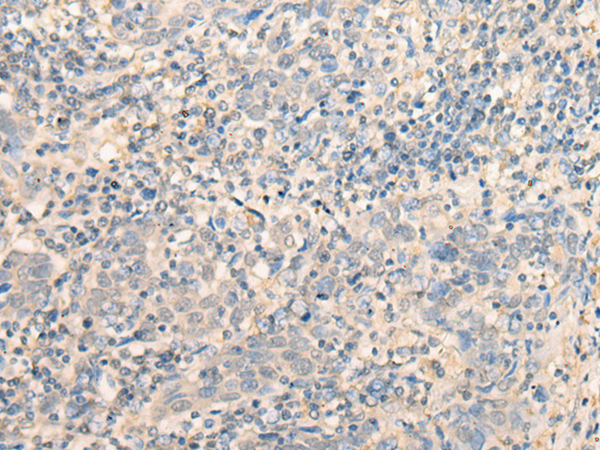
| WB | 咨询技术 | Human,Mouse,Rat |
| IF | 咨询技术 | Human,Mouse,Rat |
| IHC | 1/30-1/150 | Human,Mouse,Rat |
| ICC | 技术咨询 | Human,Mouse,Rat |
| FCM | 咨询技术 | Human,Mouse,Rat |
| Elisa | 1/5000-1/10000 | Human,Mouse,Rat |
| Aliases | HLALS |
| Host/Isotype | Rabbit IgG |
| Antibody Type | Primary antibody |
| Storage | Store at 4°C short term. Aliquot and store at -20°C long term. Avoid freeze/thaw cycles. |
| Species Reactivity | Human |
| Immunogen | Fusion protein of human MR1 |
| Formulation | Purified antibody in PBS with 0.05% sodium azide and 50% glycerol. |
+ +
以下是关于MR1抗体的3篇代表性文献的简要总结:
---
1. **文献名称**: *MR1 presents microbial vitamin B metabolites to MAIT cells*
**作者**: Kjer-Nielsen, L. et al.
**摘要**: 该研究首次解析了MR1蛋白与微生物代谢产物(维生素B衍生物)结合的结构,揭示了MR1向MAIT细胞呈递抗原的分子机制,为开发靶向MR1的抗体提供了理论基础。
---
2. **文献名称**: *Antibody-mediated targeting of MR1 enhances antitumor immunity*
**作者**: Crowther, M.D. et al.
**摘要**: 研究团队开发了一种新型MR1特异性抗体,证明其可通过激活MAIT细胞和增强T细胞应答,显著抑制多种实体瘤的生长,为癌症免疫治疗提供了新策略。
---
3. **文献名称**: *A conserved human T cell population targets mycobacterial antigens presented by MR1*
**作者**: Gold, M.C. et al.
**摘要**: 该文献发现MR1依赖的T细胞能识别分枝杆菌抗原,并通过阻断MR1抗体证实了其在抗感染免疫中的关键作用,为感染性疾病中的MR1靶向治疗奠定基础。
---
**注**:若需具体文献来源或更多细节,可进一步提供DOI或期刊信息。
MR1 (MHC class I-related molecule 1) is a conserved antigen-presenting molecule that binds microbial vitamin B2 (riboflavin)-derived metabolites, enabling immune recognition of infected or metabolically stressed cells. Unlike classical MHC-I proteins, MR1 is non-polymorphic and presents ligands to mucosal-associated invariant T (MAIT) cells, a subset of innate-like T cells abundant in humans. MAIT cells express semi-invariant T-cell receptors (TCRs) that recognize MR1-ligand complexes, triggering rapid effector responses against bacterial and fungal pathogens.
MR1-specific antibodies are critical tools for studying MR1 biology and therapeutic targeting. Early monoclonal antibodies (e.g., 26.5. 8F2.F9) helped characterize MR1's structure, expression, and ligand-binding dynamics. Recent advances include MR1-blocking antibodies that inhibit MAIT cell activation, potentially useful in autoimmune or inflammatory diseases, and MR1-targeting antibodies for cancer immunotherapy. For example, MR1-engaging bispecific antibodies or CAR-T cells aim to redirect T cells against MR1-expressing malignancies. MR1’s broad expression across tissues and its role in microbial immunity make it a unique target for infectious disease and oncology research. However, challenges remain in optimizing antibody specificity and understanding MR1 ligand diversity in different pathological contexts. Ongoing studies explore MR1’s interplay with the microbiome and its therapeutic modulation via antibodies.
×